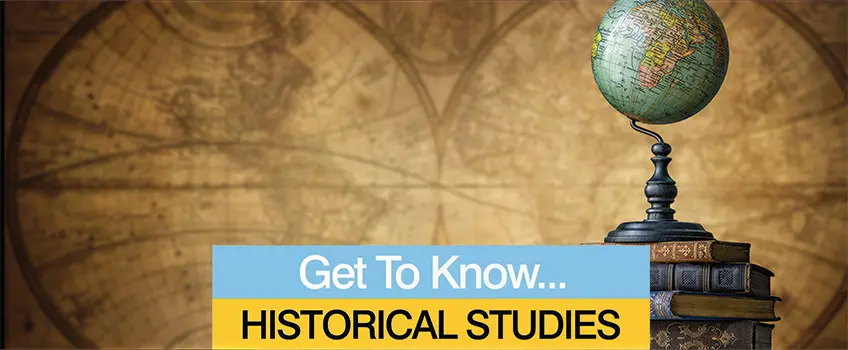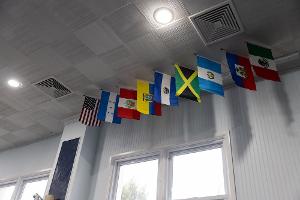Historical Studies
Within the Historical Studies program you can pursue a B.A. degree in Historical Studies
or in K-12 or Secondary Education History Certification. A minor in Historical Studies
is also available.
About the Program
The Historical Studies curriculum offers courses that acquaint students with the various methods of historical study, provide them with a broad understanding of the major themes of human history, and give them the opportunity to propose and implement their own research projects. Designed to help students develop careful, thoughtful self-expression, particularly in written form, the curriculum is composed of courses of increasing difficulty, progressing from introductory and intermediate courses in content areas, to upper-level seminars and finally to the senior capstone courses, Historical Methods and Thesis Seminar. The capstone seminars provide opportunities for students to explore their individual research interests and share their experiences with faculty and their peers. Students also achieve competence in a second language, which they may put to use in study tours and semester or summer study abroad.
Students interested in pairing a degree in History with teaching certification for K-12 are encouraged to explore the K-12 History Certification Concentration. Core history course requirements remain the same, while cognates and At-Some-Distance courses are tailored to facilitate students’ progress through the courses required for New Jersey Teachers Certification.
Historical Studies courses prepare majors to:
- Identify and analyze arguments by others.
- Generate important, open-ended questions and hypotheses about the past and devise research strategies to answer/test them.
- Write clearly and use evidence to craft compelling arguments.
- Understand situations from a range of perspectives especially those that have not traditionally been preserved, including Black, Indigenous, people of color, LGBTQ, and women, among others.
- Appreciate historical origins, causation, and changes and continuities over time, space, and culture.
- Use historical thinking both in their future professional endeavors and also as engaged citizens.
The Historical Studies program at Stockton University provided me with core research and analytical skills that have benefited my various roles in the field of library and archives. I felt supported by my professors who expressed care in my quality of work, historical interests, and professional endeavors. An aspect of the program that I am very appreciative for is the thesis course, which many other undergraduate history programs do not require. While writing a thesis was challenging, it encouraged me to deeply engage with primary sources - which I now handle on a daily basis. I highly recommend the program as it has proved to stimulate and expand my professional and personal interests.

B.A. in Historical Studies
- Creativity & Innovation
Pursue your passion. Are you a history buff? Do you watch the History Channel? Are you fascinated by the Civil War or the Holocaust? Do you like to travel and explore the U.S. and other countries? Would you love to teach, to work in museums and historic sites? As a Stockton History major, you can do all of these things and even get course credit for them. - Critical Thinking, Global Awareness
Understand your past while preparing for your present. History deals with real people and events. It offers a boundless variety for selecting favorite topics and pursuing personal interests because everything has a history—nations, wars, ethnic groups, sexuality, jazz, gambling, even food. And historical knowledge is powerful currency for the twenty-first century because you increase your cultural literacy and sensitivity when you consider multiple points of view and changing global contexts. - Information Literacy & Research Skills, Adapting to Change, Communication Skills
Carry out undergraduate research tailored to your unique interests. Many employers are looking for evidence that students did more with their college years than just sit in courses. Stockton History majors learn to read critically, write clearly and persuasively, and do independent research in archives in South Jersey and beyond. These skills are attractive in a wide range of fields, and History majors go on to careers in education, public history, law, business, medicine, government, and not-for-profits—all of which value the ability to research, write, and think creatively and persuasively. - Global Awareness
Explore study abroad and internship opportunities for credit. Stockton History majors have the opportunity to study abroad around the world. They can apply to The Washington Center to spend a summer or semester working in the government agency or not-for-profit of their choice. - Program Competence
Interested in attending graduate school? At Stockton, History majors can apply to the Master of Arts in American Studies or in Holocaust & Genocide Studies. They can choose a second major in Education. Qualified students can start taking graduate courses in their senior year—and those graduate course credits can transfer to graduate programs elsewhere in the state.
Curriculum
The Historical Studies program offers degrees in the following concentrations:
Program Courses: 40 credits
Core Required Courses for all majors:
must be taken at Stockton University (4 credits)
- HIST 2101 - Introduction to the Study of History
Content Area Courses: at least one 1000-3000 level course in each category (16 credits):
- HIST 2110 – The Ancient Roman World
- HIST 2111 – The World of Ancient Greece
- HIST 2113 – Imperial Byzantium
- HIST 2119 – History of Ancient Egypt
- HIST 2127 – Ottoman History
- HIST 2131 – Islam and Eastern Christianity
- HIST 2132 – The Bronze Age of Greece
- HIST 2154 – Christians and Muslims in the Middle Ages
- HIST 2172 – World History I
- HIST 2200 – Ancient Israel
- HIST 2201 – Iron Age Mediterranean
- HIST 2202 – Greco-Persian Wars
- HIST 2203 – Material Culture
- HIST 2403 – History of Christian Thought I
- HIST 2405 – Eastern Christianity
- HIST 2406 – The Middle Ages
- HIST 2407 – Problems in Ancient History
- HIST 2408 – Emperors, Patriarchs & Sultans
- HIST 2409 – Bronze Age Mediterranean
- HIST 2410 – Reading Egyptian Hieroglyphics
- HIST 2195 – Pre-Modern Chinese History
- HIST 2196 – East Asia: Traditions and Culture
- HIST 3104 – The Bible as History
- HIST 3308 – Sex and Gender in Antiquity
- HIST 3426 – Pirates, Outlaws & Migrants
- HIST 3607 – Age of Constantine the Great
- HIST 3608 – Nationalism in Antiquity
- HIST 3610 – Age of Justinian
- HIST 3626 – History and Geography of Asia Minor
- HIST 1152 – Introduction to U.S. History to 1865
- HIST 1153 – Introduction to U.S. History Since 1865
- HIST 1160 – Latin American Hist. Political Development
- HIST 1161 – Latin America: Social History
- HIST 2123 – America in the 1960’s
- HIST 2128 – Atlantic History
- HIST 2152 – North American History to 1789
- HIST 2153 – US History: 1789-1865
- HIST 2162 – U.S. History: 1865-1921
- HIST 2163 – U.S. History Since 1920
- HIST 2169 – American Jewish Women
- HIST 2171 – The Black Atlantic
- HIST 2177 – Teaching with Historic Places: NJ History
- HIST 2330 – African American Civilization to 1865
- HIST 2331 – African American History since 1865
- HIST 2334 – Atlantic Revolutions
- HIST 2335 – Introduction to Public History
- HIST 3103 – 1930's America
- HIST 3105 – Civil War & Reconstruction
- HIST 3605 – Slavery and Emancipation
- HIST 2106 – Modern Middle East History
- HIST 2127 – Ottoman History, 1299-1923
- HIST 2131 – Islam and Eastern Christianity
- HIST 2140 – History of India
- HIST 2146 – Indian Ocean History
- HIST 2149 – Postcolonial India
- HIST 2172 – World History I
- HIST 2190 – East Asia 1800-1945
- HIST 2191 – Modern China
- HIST 2192 – Korean History
- HIST 2193 – Modern Japan
- HIST 2194 – Asia, Post-World War II
- HIST 2195 – Pre-Modern Chinese History
- HIST 2196 – East Asia: Traditions and Culture
- HIST 2197– Imperialism in Modern East Asia
- HIST 3100 – The Vietnam War
- HIST 3621 – Seminar in World History
- HIST 3612 – Empire to Nation-State: Turkey
- HIST 3626 – History and Geography of Asia Minor
- HIST 3627 – History of Pakistan and Afghanistan
- HIST 3630 – War, Refugees & Humanitarianism
- HIST 2102 – Southeastern Europe Since 1453
- HIST 2103 – Mediterranean History
- HIST 2105 – Nation Building: Modern Greece
- HIST 2117 – Modern Germany
- HIST 2118 – Europe in the Twentieth Century
- HIST 2120 – Europe: 1400 to 1815
- HIST 2121 – Europe: 1815 to The Present
- HIST 2122 – Modern Britain: 1688 to Present
- HIST 2134 – Eastern European History
- HIST 2135 – Modern Russia and Soviet History
- HIST 2309 – Mediterranean Music and Culture
- HIST 2404 – History of Christian Thought II
- HIST 2406 – The Middle Ages
- HIST 2408 – Emperors, Patriarchs & Sultans
- HIST 3101 – Memory of World War II
- HIST 3426 – Pirates, Outlaws & Migrants
- HIST 3609 – Modern Hellenism
- HIST 3614 – Revolution and Enlightenment
- HIST 3615 – Mussolini, Hitler, Stalin: Dictatorships of 20th Century Europe
- HIST 3616 – History of the Third Reich
- HIST 3620 – Seminar: Studies in “Modern” History
- HIST 3630 – War, Refugees & Humanitarianism
Two HIST courses at 3000-level or higher (8 credits):
These may fulfill content areas, above, or may include internships, summer research,
and independent study projects.
Two Advanced Seminars in History from among the following
must be taken at Stockton University (8 credits):
- HIST 4655 - Advanced History Seminar: Power
- HIST 4656 - Advanced History Seminar: Identity
- HIST 4657 - Advanced History Seminar: Nature
- HIST 4658 - Advanced History Seminar: Belief
- HIST 4659 - Advanced History Seminar: Special Topics
Two-course sequence culminating in the Senior History Thesis
must be taken at Stockton University (8 credits):
- HIST 4690 - Historical Methods
- HIST 4691 - Thesis Seminar
NOTE: A minimum grade of C or better is required for all program and cognate courses counted toward the 64 program and cognate credits required for graduation.
Additional courses in AFRI, DANC, MUSC, THTR, ARTV, COMM, HIST, LANG, LITT, or PHIL. Additional HIST courses may be taken as electives, according to student interest or in order to fulfill the 40-credit requirement.
Choose one of the following:
- Complete the study of one language through the Intermediate II level, or two languages through the Beginning II level (8-16 credits).
- Complete an interdisciplinary culture studies minor (20-21 credits): Africana Studies, Holocaust and Genocide Studies, Disability Studies, Global Studies, Jewish Studies, Latin and Caribbean Studies, Women’s, Gender and Sexuality Studies, or Digital Studies. HIST courses used to satisfy the minor may not be used for the major except as electives/cognates.
- Complete approved study abroad program. The student participates in a HIST advisor approved study abroad program in a non-English speaking country. Language intensive programs should be six weeks or longer. Non-language intensive programs should be for at least one semester. Study abroad programs may be used to fulfill part or all of the language requirement. Transfer credit varies.
- Achievement of a score of “Intermediate Mid” on the ACTFL Oral Proficiency exam or other approved testing option. For information on testing consult visit the American Council on the Teach of Foreign Languages OR www.languagetesting.com.
25 % of all the courses a student takes at Stockton must be General Studies courses.
For all first-year students and transfer students with fewer than 64 credits (B.A.
degree), the following courses are required.
General Arts and Humanities (GAH) — 8 credits
General Interdisciplinary (GEN) — 4 credits
General Integration and Synthesis (GIS)* — 4 credits
General Natural Science and Mathematics (GNM) — 8 credits
General Social Science (GSS) — 8 credits
*Must be taken in junior or senior year
NOTE: No more than 16 credits in any General Studies course may be applied toward the B.A. degree.
Arts (A)
Historical Conciousness (H)
International/Multicultural (I)
1 W1 course (any level)
1 W1 or W2 course (any level)
1 W1 or W2 course 3000-level
NOTE: W2 courses must be taken at Stockton University.
1 Q1 course (any level)
1 Q1 or Q2 course (any level)
NOTE: Q2 courses must be taken at Stockton University.
1 R1 course (any level)
Reminder: “The student is responsible for ensuring that all graduation requirements are met”
(Bulletin). It is important that you consult with your preceptor and/or the Center
for Academic Advising on a regular basis.
All Bachelor’s Degree programs require a minimum of 128 credits and a 2.00 cumulative
G.P.A.
For more information on the Historical Studies program, please consult the Academic Bulletin.
Course descriptions and prerequisite information may be found in the Catalog of Courses.
Program Courses: 40 credits
Core Required Courses for all majors:
must be taken at Stockton University (4 credits)
- HIST 2101 - Introduction to the Study of History
Content Area Courses: at least one 1000-3000 level course in each category (16 credits):
- HIST 2110 – The Ancient Roman World
- HIST 2111 – The World of Ancient Greece
- HIST 2113 – Imperial Byzantium
- HIST 2119 – History of Ancient Egypt
- HIST 2127 – Ottoman History
- HIST 2131 – Islam and Eastern Christianity
- HIST 2132 – The Bronze Age of Greece
- HIST 2154 – Christians and Muslims in the Middle Ages
- HIST 2172 – World History I
- HIST 2200 – Ancient Israel
- HIST 2201 – Iron Age Mediterranean
- HIST 2202 – Greco-Persian Wars
- HIST 2203 – Material Culture
- HIST 2403 – History of Christian Thought I
- HIST 2405 – Eastern Christianity
- HIST 2406 – The Middle Ages
- HIST 2407 – Problems in Ancient History
- HIST 2408 – Emperors, Patriarchs & Sultans
- HIST 2409 – Bronze Age Mediterranean
- HIST 2410 – Reading Egyptian Hieroglyphics
- HIST 2195 – Pre-Modern Chinese History
- HIST 2196 – East Asia: Traditions and Culture
- HIST 3104 – The Bible as History
- HIST 3308 – Sex and Gender in Antiquity
- HIST 3426 – Pirates, Outlaws & Migrants
- HIST 3607 – Age of Constantine the Great
- HIST 3608 – Nationalism in Antiquity
- HIST 3610 – Age of Justinian
- HIST 3626 – History and Geography of Asia Minor
- HIST 1152 – Introduction to U.S. History to 1865
- HIST 1153 – Introduction to U.S. History Since 1865
- HIST 1160 – Latin American Hist. Political Development
- HIST 1161 – Latin America: Social History
- HIST 2123 – America in the 1960’s
- HIST 2128 – Atlantic History
- HIST 2152 – North American History to 1789
- HIST 2153 – US History: 1789-1865
- HIST 2162 – U.S. History: 1865-1921
- HIST 2163 – U.S. History Since 1920
- HIST 2169 – American Jewish Women
- HIST 2171 – The Black Atlantic
- HIST 2177 – Teaching with Historic Places: NJ History
- HIST 2330 – African American Civilization to 1865
- HIST 2331 – African American History since 1865
- HIST 2334 – Atlantic Revolutions
- HIST 2335 – Introduction to Public History
- HIST 3103 – 1930's America
- HIST 3105 – Civil War & Reconstruction
- HIST 3605 – Slavery and Emancipation
- HIST 2106 – Modern Middle East History
- HIST 2127 – Ottoman History, 1299-1923
- HIST 2131 – Islam and Eastern Christianity
- HIST 2140 – History of India
- HIST 2146 – Indian Ocean History
- HIST 2149 – Postcolonial India
- HIST 2172 – World History I
- HIST 2190 – East Asia 1800-1945
- HIST 2191 – Modern China
- HIST 2192 – Korean History
- HIST 2193 – Modern Japan
- HIST 2194 – Asia, Post-World War II
- HIST 2195 – Pre-Modern Chinese History
- HIST 2196 – East Asia: Traditions and Culture
- HIST 2197– Imperialism in Modern East Asia
- HIST 3100 – The Vietnam War
- HIST 3612 – Empire to Nation-State: Turkey
- HIST 3621 – Seminar in World History
- HIST 3626 – History and Geography of Asia Minor
- HIST 3627 – History of Pakistan and Afghanistan
- HIST 3630 – War, Refugees & Humanitarianism
- HIST 2102 – Southeastern Europe Since 1453
- HIST 2103 – Mediterranean History
- HIST 2105 – Nation Building: Modern Greece
- HIST 2117 – Modern Germany
- HIST 2118 – Europe in the Twentieth Century
- HIST 2120 – Europe: 1400 to 1815
- HIST 2121 – Europe: 1815 to The Present
- HIST 2122 – Modern Britain: 1688 to Present
- HIST 2134 – Eastern European History
- HIST 2135 – Modern Russia and Soviet History
- HIST 2309 – Mediterranean Music and Culture
- HIST 2404 – History of Christian Thought II
- HIST 2406 – The Middle Ages
- HIST 2408 – Emperors, Patriarchs & Sultans
- HIST 3101 – Memory of World War II
- HIST 3609 – Modern Hellenism
- HIST 3426 – Pirates, Outlaws & Migrants
- HIST 3614 – Revolution and Enlightenment
- HIST 3615 – Mussolini, Hitler, Stalin: Dictatorships of 20th Century Europe
- HIST 3616 – History of the Third Reich
- HIST 3620 – Seminar: Studies in “Modern” History
- HIST 3630 – War, Refugees & Humanitarianism
Two HIST courses at 3000-level or higher (8 credits):
These may fulfill content areas, above, or may include internships, summer research,
and independent study projects.
Two Advanced Seminars in History from among the following
must be taken at Stockton University (8 credits):
- HIST 4655 - Advanced History Seminar: Power
- HIST 4656 - Advanced History Seminar: Identity
- HIST 4657 - Advanced History Seminar: Nature
- HIST 4658 - Advanced History Seminar: Belief
- HIST 4659 - Advanced History Seminar: Special Topics
Two-course sequence culminating in the Senior History Thesis
must be taken at Stockton University (8 credits):
- HIST 4690 - Historical Methods
- HIST 4691 - Thesis Seminar
NOTE: A minimum grade of C or better is required for all program and cognate courses counted toward the 64 program and cognate credits required for graduation.
The NJ Dept. of Education requires a minimum cumulative GPA of 3.00 for teacher certification.
A grade of B– or better is required in all professional education courses.
Students must satisfy all Historical Studies Program and Teacher Education Program
requirements. See Education for complete requirements for teacher licensure.
- EDUC 4605 Methods of Teaching Social Studies (4 credits)
- EDUC 4990 Full-Time Final Clinical Practice in EDUC (12 credits)
- EDUC 4120 Reading in the Content Area (2 credits)
Additional HIST courses may be taken as electives, according to student interest or in order to fulfill the 40-credit requirement.
Choose one of the following:
- Complete the study of one language through the Intermediate II level, or two languages through the Beginning II level (8-16 credits).
- Complete an interdisciplinary culture studies minor (20-21 credits): Africana Studies, Holocaust and Genocide Studies, Disability Studies, Global Studies, Jewish Studies, Latin and Caribbean Studies, Women’s, Gender and Sexuality Studies, or Digital Studies. HIST courses used to satisfy the minor may not be used for the major except as electives/cognates.
- Complete approved study abroad program. The student participates in a HIST advisor approved study abroad program in a non-English speaking country. Language intensive programs should be six weeks or longer. Non-language intensive programs should be for at least one semester. Study abroad programs may be used to fulfill part or all of the language requirement. Transfer credit varies.
- Achievement of a score of “Intermediate Mid” on the ACTFL Oral Proficiency exam or other approved testing option. For information on testing consult visit the American Council on the Teach of Foreign Languages OR www.languagetesting.com.
25 % of all the courses a student takes at Stockton must be General Studies courses.
For all first-year students and transfer students with fewer than 64 credits (B.A.
degree), the following courses are required.
General Arts and Humanities (GAH) — 8 credits
General Interdisciplinary (GEN) — 4 credits
General Integration and Synthesis (GIS)* — 4 credits
General Natural Science and Mathematics (GNM) — 8 credits
General Social Science (GSS) — 8 credits
*Must be taken in junior or senior year
NOTE: No more than 16 credits in any General Studies course may be applied toward the B.A. degree.
Professional Requirements (See School of Education for additional GPA, Tests, & Clearance Requirements)
- EDUC 2231 - Development of the Learner* (4 credits)
- GSS 3360 - Schools of the Future* (4 credits)
- EDUC 2241 - Inclusive Learning in Education* (4 credits)
- INTC 2610 - Instructional Technology for K-12 Teachers* (4 credits)
- EDUC 2000 - Gateway to NJ Teaching Profession (1 credits)
- EDUC 3100 - Part-Time Clinical Experience (2 credits) + 50 hours in urban school setting
- EDUC 3101 - Part-Time Clinical Practice I in Education (2 credits) +100 hours in a 6-12 school setting
- EDUC 3200 - Practices and Techniques (4 credits)
- EDUC 4600 - Part-Time Clinical Practice II in Education (2 credits) +100 hours in a 6-12 school setting
- EDUC 4991 - Final Clinical Practice Seminar (2 credits)
- EDUC 4992 - EdTPA Capstone (2 credits)
*Or equivalent. See the School of Education for more information.
Arts (A)
Historical Conciousness (H)
International/Multicultural (I)
1 W1 course (any level)
1 W1 or W2 course (any level)
1 W1 or W2 course 3000-level
NOTE: W2 courses must be taken at Stockton University.
1 Q1 course (any level)
1 Q1 or Q2 course (any level)
NOTE: Q2 courses must be taken at Stockton University.
1 R1 course (any level)
Reminder: “The student is responsible for ensuring that all graduation requirements are met”
(Bulletin). It is important that you consult with your preceptor and/or the Center
for Academic Advising on a regular basis.
All Bachelor’s Degree programs require a minimum of 128 credits and a 2.00 cumulative
G.P.A.
For more information on the Historical Studies program, please consult the Academic Bulletin.
Course descriptions and prerequisite information may be found in the Catalog of Courses.
Historical Studies Minor: 20 credits
Complete five HIST courses with a grade of C or better. No more than three courses should be at the 1000 or 2000 level. At least two courses must be at the 3000 level or above.
Students may choose to substitute approved electives for one of the lower-level HIST requirements as well as one of the upper-level HIST requirements, as indicated below:
- HIST course at any level (usually 1000-2000, 4 credits)
- HIST course at any level (usually 1000-2000, 4 credits)
- HIST course at any level or approved elective at any level (usually 1000-2000, 4 credits).*
- HIST course, 3000-level or higher (4 credits)
- HIST course, 3000-level or higher or approved elective, 3000-level or higher (4 credits). **
- GAH 1046 - Greek Culture & Modern Hellenism
- GAH 1064 - Migration and Immigration
- GAH 1075 - History and Video Games
- GAH 1101 - Western Civilization
- GAH 1370 - Chinese Culture
- GAH 1630 - World Civilizations to 1500
- GAH 2156 - History of Antisemitism
- GAH 2163 - Wellness in America
- GAH 2185 - The Historical Jesus
- GAH 2217 - Mexico Since the Revolution
- GAH 2275 - Introduction to American Studies
- GAH 2309 - Honors: Inventing the Past
- GAH 2337 - Banana Republic
- GAH 2346 - Modern Europe
- GAH 2361 - Migration and Immigration
- GEN 1302 - Intro to Latin America and the Caribbean
- GSS 2246 - Introduction to the Middle East
- POLS 2100 - Introduction to American Politics
- EDUC 4990 - Full-time Final Clinical Practice in Education
- GAH 3119 - Multicultural Latin America
- GAH 3135 - WW2 in Film and Literature
- GAH 3617 - Meanings of Motherhood
- GIS 3643 - The Vietnam War
- GSS 3946 - Holocaust Center Internship
- MAAS course - 5000-level
- MAHG course - 5000-level
- POLS 3900 - Political Science local internship
- WASH 3940 - Washington internship
Students should consult with a Historical Studies faculty member to ensure that these requirements are met.
Core Required Courses for all majors:
must be taken at Stockton University (4 credits)
- HIST 2101 - Introduction to the Study of History
Content Area Courses: at least one 1000-3000 level course in each category (16 credits):
- HIST 2110 – The Ancient Roman World
- HIST 2111 – The World of Ancient Greece
- HIST 2113 – Imperial Byzantium
- HIST 2119 – History of Ancient Egypt
- HIST 2127 – Ottoman History
- HIST 2131 – Islam and Eastern Christianity
- HIST 2132 – The Bronze Age of Greece
- HIST 2154 – Christians and Muslims in the Middle Ages
- HIST 2172 – World History I
- HIST 2200 – Ancient Israel
- HIST 2201 – Iron Age Mediterranean
- HIST 2202 – Greco-Persian Wars
- HIST 2203 – Material Culture
- HIST 2403 – History of Christian Thought I
- HIST 2405 – Eastern Christianity
- HIST 2406 – The Middle Ages
- HIST 2407 – Problems in Ancient History
- HIST 2408 – Emperors, Patriarchs & Sultans
- HIST 2409 – Bronze Age Mediterranean
- HIST 2410 – Reading Egyptian Hieroglyphics
- HIST 2195 – Pre-Modern Chinese History
- HIST 2196 – East Asia: Traditions and Culture
- HIST 3104 – The Bible as History
- HIST 3308 – Sex and Gender in Antiquity
- HIST 3426 – Pirates, Outlaws & Migrants
- HIST 3607 – Age of Constantine the Great
- HIST 3608 – Nationalism in Antiquity
- HIST 3610 – Age of Justinian
- HIST 3626 – History and Geography of Asia Minor
- HIST 1152 – Introduction to U.S. History to 1865
- HIST 1153 – Introduction to U.S. History Since 1865
- HIST 1160 – Latin American Hist. Political Development
- HIST 1161 – Latin America: Social History
- HIST 2123 – America in the 1960’s
- HIST 2128 – Atlantic History
- HIST 2152 – North American History to 1789
- HIST 2153 – US History: 1789-1865
- HIST 2162 – U.S. History: 1865-1921
- HIST 2163 – U.S. History Since 1920
- HIST 2169 – American Jewish Women
- HIST 2171 – The Black Atlantic
- HIST 2177 – Teaching with Historic Places: NJ History
- HIST 2330 – African American Civilization to 1865
- HIST 2331 – African American History since 1865
- HIST 2334 – Atlantic Revolutions
- HIST 2335 – Introduction to Public History
- HIST 3103 – 1930's America
- HIST 3105 – Civil War & Reconstruction
- HIST 3605 – Slavery and Emancipation
- HIST 2106 – Modern Middle East History
- HIST 2127 – Ottoman History, 1299-1923
- HIST 2131 – Islam and Eastern Christianity
- HIST 2140 – History of India
- HIST 2146 – Indian Ocean History
- HIST 2149 – Postcolonial India
- HIST 2172 – World History I
- HIST 2190 – East Asia 1800-1945
- HIST 2191 – Modern China
- HIST 2192 – Korean History
- HIST 2193 – Modern Japan
- HIST 2194 – Asia, Post-World War II
- HIST 2195 – Pre-Modern Chinese History
- HIST 2196 – East Asia: Traditions and Culture
- HIST 2197– Imperialism in Modern East Asia
- HIST 3100 – The Vietnam War
- HIST 3612 – Empire to Nation-State: Turkey
- HIST 3621 – Seminar in World History
- HIST 3626 – History and Geography of Asia Minor
- HIST 3627 – History of Pakistan and Afghanistan
- HIST 3630 – War, Refugees & Humanitarianism
- HIST 2102 – Southeastern Europe Since 1453
- HIST 2103 – Mediterranean History
- HIST 2105 – Nation Building: Modern Greece
- HIST 2117 – Modern Germany
- HIST 2118 – Europe in the Twentieth Century
- HIST 2120 – Europe: 1400 to 1815
- HIST 2121 – Europe: 1815 to The Present
- HIST 2122 – Modern Britain: 1688 to Present
- HIST 2134 – Eastern European History
- HIST 2135 – Modern Russia and Soviet History
- HIST 2309 – Mediterranean Music and Culture
- HIST 2404 – History of Christian Thought II
- HIST 2406 – The Middle Ages
- HIST 2408 – Emperors, Patriarchs & Sultans
- HIST 3101 – Memory of World War II
- HIST 3609 – Modern Hellenism
- HIST 3426 – Pirates, Outlaws & Migrants
- HIST 3614 – Revolution and Enlightenment
- HIST 3615 – Mussolini, Hitler, Stalin: Dictatorships of 20th Century Europe
- HIST 3616 – History of the Third Reich
- HIST 3620 – Seminar: Studies in “Modern” History
- HIST 3630 – War, Refugees & Humanitarianism
Two HIST courses at 3000-level or higher (8 credits):
These may fulfill content areas, above, or may include internships, summer research,
and independent study projects.
Two Advanced Seminars in History from among the following
must be taken at Stockton University (8 credits):
- HIST 4655 - Advanced History Seminar: Power
- HIST 4656 - Advanced History Seminar: Identity
- HIST 4657 - Advanced History Seminar: Nature
- HIST 4658 - Advanced History Seminar: Belief
- HIST 4659 - Advanced History Seminar: Special Topics
Two-course sequence culminating in the Senior History Thesis
must be taken at Stockton University (8 credits):
- HIST 4690 - Historical Methods*
- HIST 4691 - Thesis Seminar*
*Both HIST 4690 and HIST 4691 may count as AMST electives for students.
3000-level and 4000-level HIST course requirements:
Selected AMST or MAHG courses may also be used to fulfill one or more of these requirements [At the discretion of your HIST advisor, up to twelve (12) credits of graduate-level courses taken as an undergraduate may be applied to the M.A. in American Studies for students enrolled in the Historical Studies/American Studies 4+1 concentration]
COGNATES: 16 credits
Additional courses in AFRI, DANC, MUSC, THTR, ARTV, COMM, HIST, LANG, LITT, or PHIL.
Students are encouraged to select elective program courses in American as well as
global history to build a strong transnational foundation for the study of American
culture at the graduate level.
American Studies Courses: 9 credits
American Studies Courses Taken During Year Four (Senior Year):
- Two (2) AMST Core Courses (6 MA equivalent to 8 BA credits)*
- AMST 5000 - Proseminar (3 credits)
- AMST 5001 - Research Methods in American Studies (3 credits)
*Students who have declared a HIST/AMST 4+1 dual degree will earn four (4) upper-division undergraduate credits during their senior year for these core AMST courses, and should consult with their HIST preceptors to determine whether these graduate credits fulfill undergraduate cognates, 3000- level HIST credits, or ASD ones. Students may also defer AMST 5001 until year five, and substitute a qualifying AMST elective.
Two (2) Additional HIST/AMST Courses (6 MA credits equivalent to 8 BA credits):
- HIST 4690 - Historical Methods (4 credits)
- Fall HIST 4691 - Thesis Seminar* (4 credits)
- Spring, and/or AMST 5xxx Elective (3 credits) (Fall or Spring, Spring recommended),
and/or
AMST 5xxx Elective (3 credits) (Spring) (for students deferring AMST 5001 to year five)
*Students must earn an A in HIST 4691 Thesis Seminar in order for the course to count for three (3) AMST graduate credits. Appeal may be made to the AMST Program Thesis Committee.
AMST Courses Taken During Year Five (MA Year) (6 courses): 18 graduate credits
Fall
- AMST Core Course (if needed), or AMST 5xxx Elective (3 credits)
- AMST 5xxx Elective (3 credits)
- AMST 5xxx Elective (3 credits)
Spring
- AMST 5xxx Elective (3 credits)
- AMST 5xxx Elective (3 credits)
- AMST 5xxx Elective (3 credits)
A minimum grade of C or better is required for all program and cognate courses counted toward the 64 program
and cognate credits required for baccalaureate graduation.
To be awarded a graduate degree in American Studies a student must have a cumulative
GPA of at least 3.0 in courses applied toward the graduate program.
Choose one of the following:
- Complete the study of one language through the Intermediate II level, or two languages through the Beginning II level (8-16 credits).
- Complete an interdisciplinary culture studies minor (20-21 credits): Africana Studies, Holocaust and Genocide Studies, Disability Studies, Global Studies, Jewish Studies, Latin and Caribbean Studies, Women’s, Gender and Sexuality Studies, or Digital Studies. HIST courses used to satisfy the minor may not be used for the major except as electives/cognates.
- Complete approved study abroad program. The student participates in a HIST advisor approved study abroad program in a non-English speaking country. Language intensive programs should be six weeks or longer. Non-language intensive programs should be for at least one semester. Study abroad programs may be used to fulfill part or all of the language requirement. Transfer credit varies.
- Achievement of a score of “Intermediate Mid” on the ACTFL Oral Proficiency exam or other approved testing option. For information on testing consult visit the American Council on the Teach of Foreign Languages OR www.languagetesting.com.
At-some-distance electives are courses that are unrelated to your major. 32 credits are required.
Three AMST courses (9 credits) to be taken in senior year may be included under ASD
requirements in consultation with your preceptor:
- AMST 5000 Proseminar in American Studies (3 credits)
- AMST 5001 Research Methods in American Studies (3 credits)
- AMST Elective course (3 credits)
Graduate courses count as 4 credits at the undergraduate level and 3 credits at the graduate level. Six AMST elective courses, including internships, independent studies, or thesis, will be finished in year five of the 4+1 year program.
25 % of all the courses a student takes at Stockton must be General Studies courses.
For all first-year students and transfer students with fewer than 64 credits (B.A.
degree), the following courses are required.
General Arts and Humanities (GAH) — 8 credits
General Interdisciplinary (GEN) — 4 credits
General Integration and Synthesis (GIS)* — 4 credits
General Natural Science and Mathematics (GNM) — 8 credits
General Social Science (GSS) — 8 credits
*Must be taken in junior or senior year
NOTE: No more than 16 credits in any General Studies course may be applied toward the B.A. degree.
**GAH 2275 Intro to American Studies is recommended for one of the GAH courses.
Arts (A)
Historical Conciousness (H)
International/Multicultural (I)
1 W1 course (any level)
1 W1 or W2 course (any level)
1 W1 or W2 course 3000-level
NOTE: W2 courses must be taken at Stockton University.
1 Q1 course (any level)
1 Q1 or Q2 course (any level)
NOTE: Q2 courses must be taken at Stockton University.
1 R1 course (any level)
Reminder: “The student is responsible for ensuring that all graduation requirements are met”
(Bulletin). It is important that you consult with your preceptor and/or the Center
for Academic Advising on a regular basis.
All Bachelor’s Degree programs require a minimum of 128 credits and a 2.00 cumulative
G.P.A.
For more information on the Dual Degree program, please consult the Academic Bulletin.
Course descriptions and prerequisite information may be found in the Catalog of Courses.
Additional Information
To view the curriculum, you’ll use the web program, Degree Works. This program is accessible even if you are not currently a student with Stockton University.
Current Students
Access your portal for Degree Works, then look for the “What If” option to explore the various paths towards degree completion. Click the button below for instructional videos on how to use Degree Works:
Prospective First Year or Transfer Students
Use the button below:
How to Use Degree Works Equivalency
- At the next page you are prompted with three (3) options. Select the one that says “continue without signing in.”
- Respond to each prompt using the pull-down menu in the center of the page. [Please be patient. It may take a few seconds for the system to process your request. If you see a NO symbol, you need to wait a moment!]
Prompts include:
- Enrollment dates (Choose intended semester attending)
- Intended level (Choose “undergraduate”)
- What degree you will pursue? (Choose “Bachelor of Arts”)
- What is your intended major? (Choose “Historical Studies”)
- What is your intended concentration? (Choose “General” or "Education")
- What is your intended minor? (Choose “none” or select one - it is not required). For History minors, select "Historical Studies."
- For prospective students, choose “I’m all done" button.
- For transfer students, use the “class” button to see how courses already taken fit into the Stockton degree path.
- You will see an overview of the degree you have selected, including all requirements.
- At the bottom of the screen, you could save or print the worksheet.
To view the Course Schedule by term, click here.
See the Catalog of Courses for complete descriptions of course offerings.
For detailed curriculum information, please refer to the Academic Bulletin.
Faculty

Laura Zucconi

Robert Gregg

Michael Hayse

Kameika Murphy


Tom Papademetriou

Adjunct Faculty




Emeritus Faculty

Demetrios Constantelos



Careers
Students pursuing degrees in Historical Studies may prepare themselves for careers in teaching, law, journalism, library science, computers, government, civil service, administration, and the ministry. A history degree can also lead to opportunities in art institutes, galleries, museums, 200 local and state historical associations, and to archival work with libraries, private organizations, and government agencies. More information on careers for Historical Studies majors and minors is available at the American Historical Association's website.
Special Opportunities
Students in Historical Studies can explore their own interests in a wide range of fields such as American/Atlantic World, European, Mediterranean, Southeast Asian, and Ancient Near Eastern history. In addition to coursework for the major, students may
- Intern with historical societies, libraries, and art museums
- Become certified to teach social studies in secondary schools
- Study abroad
- Participate in travel with the History Club
- Participate in conferences, such as those sponsored by Phi Alpha Theta, the national honor society, and by the McNeil Center for Early American Studies at the University of Pennsylvania.
BA/MA and BA/MAT Degree
Qualified Historical Studies majors are eligible for automatic admission into the MA or Certificate in American Studies at Stockton, the MA and MAT degree programs in the Federated History Department of Rutgers, Newark/NJIT, and the MA degree program in History at Rutgers, Camden.







